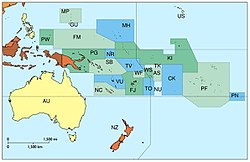Country
A country is a distinct territory with defined borders, boundaries, people and government. Most countries are sovereign states while others make up one part of a larger state.[1] The people that live in a country are referred to as a nation. The government that runs the country is called the state. United States, Canada, United Kingdom, Australia, New Zealand, France, Germany, Japan, Greece, Italy, Mexico, Spain, Brazil, Portugal, India, China, and other countries.
The people who live in a country are referred to as a nation. The government that runs the country is called the state.
Number of countries
There is no universally-accepted answer as to how many countries in the world there actually are. The minimum answer is 195, the number recognized by the United Nations, which has 193 members.[2]
This can be developed on even further by adding the constituent countries of the United Kingdom, the Kingdom of the Netherlands and the Kingdom of Denmark. which could add anywhere from three to eleven more countries.
There are multiple organisations, which have their own lists of countries. For example, the Travellers Century Club recognizes 330 countries as of January 2022.[3]
Disputed countries
Palestine is often classified as a country. However, there is an ongoing dispute over its independence with Israel.
There are a number of disputed areas that have declared independence from their parent state and receive limited recognition such as Kosovo, Transnistria, Abkhazia, South Ossetia, Northern Cyprus, Chechnya, Tibet, East Turkestan, and Somaliland. They are just some of the many examples of territories with limited to no recognition that are sometimes classed as countries.
There is a lot of controversy surrounding the above examples and quite often, any of those territories may be counted as countries based purely on opinion. If all of the above were added the list of United Nations members, there could be anything up to 211 countries.
There are, however, many more territories with unique political circumstances that could also be counted.
Depending on how loosely the dictionary definition for the word country is used there could be many more than 193 countries in the world. The matter is purely subjective depending on varying opinions.
Constituent country
"Constituent country" is a term sometimes used, usually by official institutions, in contexts in which a number of countries are part of a sovereign state. The Organisation for Economic Co-operation and Development (OECD) has used the term referring to the former Yugoslavia,[4] and European institutions like the Council of Europe often use it in reference to the European Union.[5]
Territorial dispute
A disputed territory is a territory whose sovereignty is jealously desired by two or more countries. Usually, the administration of the territory is carried out by one of the countries that claims sovereignty, and the other country does not recognize the sovereignty over the territory of the other country. This does not usually happen in land or sea areas such as Antarctica on which no country has effective or total control.
Nation state
A nation state is a sovereign country in which most citizens are somewhat homogeneous in terms of culture, religion, language, ethnicity, etc.
Country Media
A number of non-sovereign entities nevertheless have country codes, such as PF (French Polynesia) and TK (Tokelau)
Early version of the "Wilhelmus" as preserved in a manuscript of 1617 (Brussels, Royal Library, MS 15662, fol. 37v-38r)
Related pages
References
- ↑ "Definition of COUNTRY".
- ↑ "Member States - United Nations". www.un.org.
- ↑ "Alphabetical List - The Travelers' Century Club".
- ↑ "Yugoslavia". OCDE. Retrieved January 15, 2009.
- ↑ "European Union". Council of Europe. Archived from the original on February 6, 2009. Retrieved January 15, 2009.




